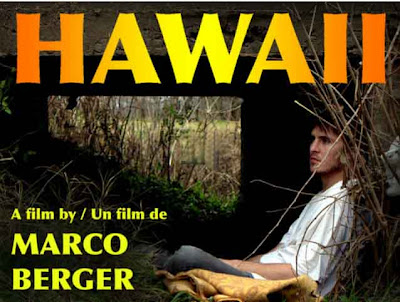
If there is anything the world needs right now (short of a quick solution to global warming, and, here in America, any means, short of armed revolution, to wrest our political elections and hence our political leaders, out of the hands of the wealthy, powerful and increasingly corporate/global), that need -- movie-wise -- is some kind of way into the labyrinthine world of
Netflix streaming. There are simply
so many choices. To that end
TrustMovies is going to try to devote a post, at least once weekly, to a
Netflix streaming tip. A new friend has even suggested that I devote an
entire blog to this, and indeed this problem could use
many blogs. (I know that
one such already exists, and it is quite good -- if a little too mainstream. Click on the previous link and try it.)
But as there is only one of me, and currently I am asked to cover an impossible amount of movies (last week, here in New York City, 25 new films opened theatrically!), I will do this as often as possible -- sometimes with a film I have only just seen, others times by re-posting an old review of a film now available to stream via Netflix). So let's start with this revisited and slightly edited post about a very important film from two years ago....

On one level
PLAN B, the currently streaming and DVD-ing Argentine film by
Marco Berger, is a fun and funny little movie about romance and revenge gone goofily awry. When Bruno (newcomer
Manuel Vignau), the hirsute, hunky but rather hollow young man who's been dumped by his girlfriend Laura (another newcomer
Mercedes Quinteros) decides to get revenge on her and her new boyfriend Pedro (played by the very interesting, works-a-lot actor
Lucas Ferraro), he suggests to Laura that her new guy looks gay -- and then begins a clandestine relationship with Pedro to try to prove his point. Berger's movie works perfectly well on this level, providing charm, smarts and even -- depending on your sophistication level and how many movies of this sort you've seen -- some surprises.
On another level (several of them, in fact,) the movie opens up a
Pandora's Box of questions that, once asked, need to be further explored, if not answered fully, since those answers will most likely differ from person to person. Mr. Berger, shown at right, appears (on the basis of what we see and hear in
Plan B) too smart a guy and too good a filmmaker not to know what he has wrought in his little rom-com-cum-stealth-missile. Is gay attraction and behavior absolutely built-in or can it be learned? Can two presumably straight guys fall in romantic love over the long haul merely by spending time together and growing attached? If so, just how malleable
is sexuality?
Over the decades,
Kinsey and other sex researchers have tried to answer questions like these, but given the strictures places on sexuality by religion and social mores, not to mention mankind's (male version) tendency to want to appear as macho as possible, getting an honest reading on the subject seems well nigh impossible. All of which makes Berger's little effort the more subversively explosive.
The two men bond easily and quickly around a few subjects they find in common, particularly games and icons from their youth. Alcohol and light drug-use help, too, as do the very natural, laid-back performances from the two actos (Vignau is shown above, right, Ferraro at left). It would make sense that neither of them would possess a trace of behavior that might appear gay -- why would they? -- so their increasing friendship seems both natural and suspect, particularly on the part of Bruno, since his original intent was to "reveal" his opponent. Revelation can come in many different ways, of course, since we
all wear masks.
As a filmmaker, Berger trusts his instinct to stay away from not only the overly expository but, surprisingly, even dialog itself. The first four minutes of the film are dialog-free -- all ambient sounds -- and often along the way, the writer/director opts for his characters to remain silent. When it does arrive, his dialog is always believable and cogent, but the film's most memorable scenes may be those that are nearly silent: at the beach, people-watching, or a character lingering over a letter until he fully comprehends it. As director, Berger also seems to enjoy showing us odd shots of local architecture -- why, I am not sure -- but these do not distract much from our enjoyment.
Plan B just may be the longest pre-coital romance in cinema history, and to the filmmaker's credit, this full-length flirtation works better than it has any right to. (Still, at 103 minutes, the movie would have profited by being cut by at least ten, so as not to test our patience
quite so much.) For a film with strong gay content, the movie is surprisingly chaste, which actually adds to its charm. When our boys wake up in the morning (above) they have their shorts
on, of course, and nothing has happened -- except some typical early morning tumescence. Finally, it's the performances by Vignau and Ferraro that do the most to bring home Berger's message: "In order to understand you, people have to see through your eyes."
Plan B allows us to do this, and the view is alternately sad and warm, foolish and funny.
Wolfe Video, increasingly important as a source for GLBT films, is the distributor of
Plan B, which became available for
sale or
rent on October, 26, 2010 --and now can be streamed via Netflix.
*******************
TrustMovies recently heard from Mr. Berger (shown at left) about his new film titled HAWAII, which is currently being partially funded by a
campaign on Kickstarter. The campaign -- to raise some $40,000 in the next four weeks (27 days actually remain) ends of October 19, so if any of my readers out there can come up with extra money (and yes, I know how difficult that is
these days), please do.
I think Berger is among the better young filmmakers working today. I am still hoping to be able to see his second film,
Absent, about which I hear wonderful things but can currently only be "Saved" on Netflix (which is often not a good sign
re actual availability, ever).
So click
here, please, and take a good long look at
Hawaii's Kickstarter campaign. Watch the filmmaker's intro/trailer (it's lovely), read about the film and what Berger hopes to accomplish, and if you are able, contribute.
*******************
Normally TM would wait until all of a particular post was available before he posted. But because I want to get world out ASAP about this
Hawaii campaign, I am posting now. As soon as I hear back from the filmmaker about his responses to my above review of Plan B, what he agrees with and what he doesn't -- a critic is not usually lucky enough to get this kind of feedback from a filmmaker (at least
this one isn't) so I am looking forward to learning what he thinks -- I'll get the remainder of this post up.
OK: Marco has weighed in (and I apologize because it has taken me awhile to find time to post his comments). But here they are, along with my questions/responses. Below,
TM is in boldface, and Marco in standard type:
M.B.: I think your analysis of the film is brilliant.
TM: I don't know that even I would go that far. But thanks!
It is true I wanted to question sexuality, taste and the roots of desire & attraction, but I don't dare to answer, just to question.
I am glad to hear you say that because, I don't know that any of us has many answers regarding sexuality -- except maybe where we ourselves are concerned.
I only wanted to say that love is a very strange thing that probably anybody can understand. But there are many that don't understand what it means to be gay,
and so with Plan B, they can maybe reflect themselves onto the film and at least get closer to understanding why sometimes we choose the same sex.
What you describe above is one of the most difficult things for a person to do, I believe. But I also think Plan B comes as close to helping us achieve this as any other movie I've seen.
Some of your doubts about the film are mysterious to me, even if I made the film.
You mean about the shots of the architecture?
What I said above is also the reason for the long building shots.
I never meant to bore people, but I wanted to let them think about every little scene
in the film and to take their own conclusions.
That's why it may be boring if you are already gay, but if you never understood gay people and then see this film, you can be in Pablo or Bruno mind and put yourself in their situation and understand a little better.
Right. And you really do let us get into their mind and feelings.
So I could say Plan B is a gay film but also is oriented to everyone, to make them think about the meaning of choosing something different.
The biggest challenge of the film is to make ANY spectator wish that these two end up together.
Thank you very much again for the review and I hope this explanation fills some of your doubts.
It does. So you are welcome -- and thank you for your movie!
for the use of the final four photos.)



.jpg)
.jpg)
.jpg)
.jpg)
.jpg)














.jpg)

.jpg)
.jpg)


















